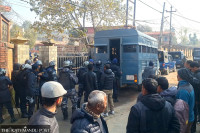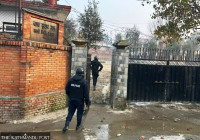Valley
Government to take steps to control haphazard throwing of used recharge cards and tobacco packets
The Office of the Prime Minister and Council of Ministers has decided to take initiatives to control the practice of haphazardly throwing used recharge cards and tobacco products’ packets on the roads as part of a fresh bid to beautify the city.
Anup Ojha & Sanjaya Lama
The Office of the Prime Minister and Council of Ministers has decided to take initiatives to control the practice of haphazardly throwing used recharge cards and tobacco products’ packets on the roads as part of a fresh bid to beautify the city.
A meeting between Shishir Kumar Dhungana, secretary at the Office of the Prime Minister and Council of Ministers, and concerned stakeholders on April 17 decided to take initiatives to this effect.
Officer bearers of the Ministry of Information and Communications Technology, Nepal Telecom, Nepal Telecommunication Authority, Ncell, along with chiefs and representatives of other telecom service providers and tobacco producers were present in the meeting.
In an effort to reduce the amount of used recharge cards in the streets, Purushottam Khanal, acting chairman of the Nepal Telecommunication Authority, said the authority is planning to replace recharge cards with a digital form of payment, giving more importance to mobile wallets. “At present, Nepal Telecom and Ncell use 25 percent and 15 percent of the digital medium respectively to recharge phones,” said Khanal.
“To make this initiative more effective, we are planning to increase the use of the digital medium instead of recharge cards to recharge mobile phones from July 17,” he added.
Khanal said the authority is also planning to bring a special offer for customers to recharge mobile phones through mobile wallet.
“We will launch a scheme that will offer some incentive to the public to collect used recharge cards,” he said. “I think this scheme will discourage people from throwing used recharge cards on the roads or in open spaces.”
Though the government has decided to take the initiative, it has not enforced any concrete policy to control the haphazard littering of tobacco products. Earlier, Kathmandu Metropolitan City had also made numerous announcements to take stringent action against those who litter the city’s road, but it has never been implemented. For instance, back in 2017, the metropolis had run a similar drive to book litterbugs with coordination from the then Chief District Officer Kedarnath Sharma and Metropolitan Traffic Police Division; however, the drive faltered before it could bring any significant change.
Earlier on Friday, the Nepal Telecommunications Authority and the Nepal Rastra Bank had signed a memorandum of understanding to work jointly to introduce regulatory policies for digital financial service providers in an effort to facilitate and regulate digital payment systems and businesses in the country. At present, e-Sewa, Khalti, IME pay, Qpay and a few other banks provide mobile wallet services to transfer balance.
Roshan Lamichhane, chief operating officer at e-Sewa, which introduced the digital system payment system in Nepal, said, “Mobile wallet users are increasing gradually in Nepal.”
“People are buying recharge cards because it is easily available in shops. If government gives priority to the digital medium to transfer balance, the trend of buying recharge cards in the shops will come down.




 21.12°C Kathmandu
21.12°C Kathmandu.jpg)












